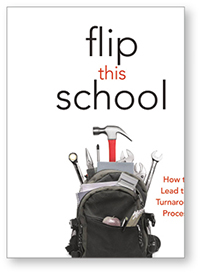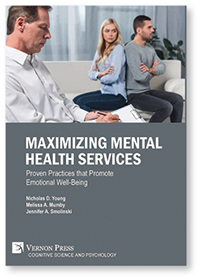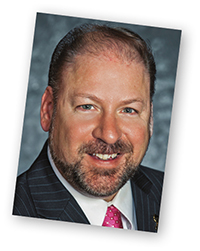
Reading & Resources
School Administrator, May 2020
Book Reviews
 Flip This School: How to Lead the Turnaround Process
by John F. Eller and Sheila A. Eller
Flip This School: How to Lead the Turnaround Process
by John F. Eller and Sheila A. Eller, Solution Tree, Bloomington, Ind., 2019, 202 pp. with index, $36.95 softcover
Fewer than 20 percent of school turnaround efforts are successful, meaning student achievement has improved to the extent it is likely to hold steady or continue to get better. As someone whose teams in multiple school districts have been 100 percent successful in similar endeavors, my assessment of this work is that it is worth reading for principals faced with the need to lead a turnaround. Practitioners will need to supplement the content to fully realize the desired conversion.
The academic references to professional literature are relevant and provide a solid mindset to approach school improvement. The suggestions vacillate between philosophical statements about leadership and detailed tactics about how to run a meeting and how to follow up. One of the better chapters is “Gathering Data About Your School,” although how to use disaggregated data is given short shrift.
Another chapter, “Obtaining Commitment from the District,” is written for an inexperienced principal with a central office unfamiliar with the school turnaround process. It contains sample conversation starters. In my experience, any principal who needs to memorize someone else’s lines is not likely to possess the moxie to improvise as needed. There will be push-back, and resisters aren’t going to read a script formulated to gain universal approval and their acquiesce. The provision of mini-scripts for various situations is a focus of this approach.
Authors John and Sheila Eller admit school leaders will face “difficult and resistant staff members.” They have even given them names: underminers, contrarians, recruiters, challenged, on-the-job retirees, resident experts, unelected representatives and whiners and complainers.
Besides identifying who fits in each category, the Ellers suggest the principal ask the superintendent to transfer all recalcitrants to other schools. After labeling staff members with such unflattering terms, an unanswered question is who would want to add such underdeveloped employees to their staff rosters? To their credit, the authors also suggest that principals leading school turnarounds ensure that each staff member knows he or she is cared for.
The book carries no mention of accountability or terminating incompetent staff members. This may explain why so few schools achieve turnarounds.
Reviewed by Art Stellar, consultant, Hingham, Mass., and retired superintendent
 Maximizing Mental Health Services: Proven Practices that Promote Emotional Well-Being
Maximizing Mental Health Services: Proven Practices that Promote Emotional Well-Being
by Nicholas D. Young, Melissa A. Mumby and Jennifer A. Smolinski, Vernon Press, Wilmington, Del., 2020, 140 pp., $43 hardcover $34.75 softcover
All of us in school administration are keenly aware of the impact of mental health and its importance to student learning. The number of students in need currently exceeds our ability to meet those needs in schools. By one estimate, 21 percent youth between 13 and 18 have experienced a severe mental health disorder and four in five will will not receive counseling, therapy, medication or any form of treatment.
Maximizing Mental Health Services: Proven Practices that Promote Emotional Well-Being is written by three distinguished educators with varied practical experience. Nicholas Young is a former Massachusetts Superintendent of the Year. Melissa Mumby is an educational team leader in Springfield, Mass., and Jennifer Smolinski, coordinates the Center for Accessibility Services and Academic Accommodations at American International College.
Their book explains the components of various therapy options and what makes each successful. In addition to individual and group therapy, the authors share a number of successful technology tools, including therapy video games.
Of greatest impact is a section explaining how the therapist’s role is much more important than the type of therapy chosen. People always do make the difference. The authors suggest the skills and characteristics one should look for in therapy candidates.
I expected this book would provide more ideas for how to serve students better, but it comes up short, reading more like a graduate school text.
Reviewed by Nancy Wagner, superintendent, River Trails School District 26, Mt. Prospect, Ill.
 Leadership is Language: The Hidden Power of What You Say — and What You Don’t
Leadership is Language: The Hidden Power of What You Say — and What You Don’t
by L. David Marquet, Portfolio/Penguin, New York, N.Y., 2020, 352 pp. with index, $18.99 hardcover
You won’t find
Leadership is Language in a search for educational leadership books -- which is too bad because David Marquet, a retired Navy submarine captain, delivers a much needed dose of reality in terms of the language we use every day in our professional lives.
Marquet contends early in the book that many of our leadership structures that include behaviors and language arose from the Industrial Revolution. This was an era when higher on the ladder meant power and control. The only problem is that those regularly immersed in the day-to-day work have the best vantage point to spot problems and recommend ideas. So what is the solution?
Marquet proposes a new leadership playbook consisting of six new “plays,” which he then contrasts to the old industrial era routines. The plays he addresses are controlling the clock rather than obeying the clock; collaboration instead of coercion; commitment instead of compliance; completion instead of continuation; improvement not proof; and connections rather than conformance.
These proposed plays accompany two kinds of work proposed in his book: “redwork,” which is the execution (the doing), and “bluework,” which is the decision-making (the thinking). Each chapter ties into one another as Marquet highlights how entire teams can work together to weave seamlessly in and out of redwork and bluework together, thereby shattering the industrial age notion of separate classes.
It does not take long for the astute educator to understand how school systems are still spinning wheels in the industrial era mud. This book would make a great study for educators at all levels to become unified in the language being used to promote a more effective and impactful organization.
Reviewed by E. Scott England, superintendent, Fairfield Public School District 112, Fairfield, Ill.
An UnCommon Theory of School Change: Leadership for Reinventing Schools
by Kevin Fahey, Angela Breidenstein, Jacy Ippolito and Frances Hensley, Teachers College Press, New York, N.Y., 2019, 130 pp., $35.95 softcover
School improvement is not a new concept. Similarly, political and social agendas have beckoned and often required school reforms. Kevin Fahey and his coauthors of
An UnCommon Theory of School Change relay the stories of educators around the country who have reinvented their environments. These stories of reinvention ground their theory of a deeper dive.
The words “deep dive” are quite popular in today’s education conversations. Rarely, however, can the individual promoting the deep dive provide specificity into what makes the dive deep. The text articulates clear behaviors to show leaders how and when they might work differently as they manage their most tangled dilemmas in the schools.
Perhaps most beneficial, this work discusses the differences between adult learning and adult development. School and district leaders would do well to understand the differences. Being the chief adult developer is a job title worthy of our aspiration.
Reviewed by Thomas Van Soelen, president, Van Soelen & Associates, Lawrenceville, Ga.
Democratic Discord in Schools
edited by Meira Levinson and Jacob Fay, Harvard Education Press, Cambridge, Mass., 2019, 342 pp. with index, $66 hardcover, $34 softcover
Superintendents will find this book a useful source for expert analyses of such contemporary issues as transgender rights, regulation of teacher speech, electronic surveillance of students, immigration, the role of law enforcement in schools, charter schools and student activism.
Democratic Discord in Schools presents eight case studies based on real situations, each followed by explanations of alternative strategies that attempt to educate students for citizenship to sustain our democracy.
The content provides administrator candidates, school board members and/or an administrator team with excellent source material to compare perspectives and to practice the respectful give-and-take that is essential for effective school administration.
In presenting alternative approaches to the complex situations described, some of the book’s case study commentators remind us of the populist disinterest on the part of white Americans in carrying out the Supreme Court’s
Brown decision for a full and equitable desegregation program. If, as this book recommends, America is to constructively address racism, injustice and intolerance, schools urgently need a social studies curriculum and administrative policies that teach the moral imperative that underlies the values of diversity and the fairness of equal citizenship. There should be no wall between school and community.
Levinson is a professor at the Harvard Graduate School of Education. Fay is a postdoctoral fellow at Harvard’s Edmond J. Safra Center for Ethics.
In public discussions, participants who can articulate an ethical rationale usually prevail. However to do this, a superintendent needs to be acquainted with alternative perspectives.
Democratic Discord in Schools acquaints educators with the moral perspectives that bolster our democracy.
Reviewed by Louis Wildman, professor emeritus of education leadership, California State University-Bakersfield, and a retired superintendent
School Leadership That Works: Ideas From Around the World
edited by Peter R. Litchka, Rowman & Littlefield, Lanham, Md., 2019, 90 pp., $24.64 softcover.
Peter Litchka’s premise in managing this new work is that educational institutions can be better for students if educators are able to share global scholarship.
School Leadership That Works: Ideas From Around the World is divided into four chapters. Each chapter is written by expert researchers, detailing different views of school leadership development. The topics take a multi-national approach to universal school leadership development, with an overview of school leadership development in China, a study from Turkey about leadership interactions within a school and the development of educational leaders within the postsecondary context in Ontario, Canada.
Litchka has 47 years in public education as a teacher, school and district administrator. He is a professor of educational leadership at Loyola University in Maryland and president of the International Society for Educational Planning.
The study of international perspectives in education can be highly useful for leadership growth. However, I did not find the four chapters yielding any significant revelations about how other systems approach education to increase student or teacher or leader achievement nor did this book provide any ready-to-use takeaways for school leaders.
Perhaps this book could serve as useful reading for researchers or university instructors, but if school system leaders are looking overseas for innovative practices regarding school schedules, curriculum leadership or instructional practices, those won’t be found here.
Reviewed by Marilyn King, deputy superintendent of instruction, Bozeman Public Schools, Bozeman, Mont.
 Why I Wrote this Book…
Why I Wrote this Book…
“Having been fortunate to be a part of a high-performing school district, as well as possessing experiences in graduate-level teaching, the private sector and military, I recognized listening as a key attribute to successful organizations, and as such I felt I had something good to offer a wider audience. … Avoiding poor decisions through effective listening is a natural place to start in conveying one of the most important criteria for effective leadership.”
Louis J. Pepe, assistant superintendent/chief financial officer, Summit, N.J., and AASA member since 2005 on writing Smarter Decision-Making: Avoiding Poor Decisions Through Effective Listening (Rowman & Littlefield, 2019)
Abstract
Trust Building
School leaders may often overlook the importance of trust building between teachers and administrators, according to a newly finished doctoral dissertation by Ryan Place at the University of Massachusetts Lowell.
He studied five school leaders to learn how they influence trust levels. Using data from administrator surveys, individual interviews, workplace observations and survey results provided by administrators involved with the study, the researcher found that building relationships with teachers enabled school leaders to influence trust levels. Using strategies such as openness, honesty, communication, supportiveness and consistency as well as creating a positive working environment, school leaders influence trust levels with teachers.
Copies of “How Do School Leaders Influence Trust Levels between Teachers and Administrators: A Case Study” are available from ProQuest at 800-521-0600 or
disspub@proquest.com.
Bits & Pieces
School Calendars
The National School Public Relations Association’s “
Resources for Planning the School Calendar 2020-2021” includes a list and descriptions of holidays, historical markers and other notable events to help school district leaders and school staff members plan their school-year schedules for lessons, events and testing. The cost is $40.
Graduation Rates
The National Center for Education Statistics reported that for the first time in 40 years the high school completion rate for 18-to-24-year-old black and white students was not measurably different.
Read “
Trends in High School Dropout and Completion Rates in the United States: 2019."
Cultural Practices
REL Mid-Atlantic at Mathematica is
offering on-demand recordings of its free four-part series on culturally responsive practices as strategies for improving outcomes.
The first webinar is available on
YouTube.
Academic Impact
A Campbell
systematic review found no effect of professional development on social and emotional or language and literacy development interventions on student academic out-comes.
Continuing professional development aims to improve outcomes for young people with whom educational and welfare professionals work.
Recycling Initiative
Recycle Across America, which has promoted standardized recycling labels, is showing school districts how to educate students to recycle and how to use the recycling to save thousands of dollars each year.
Tech Integration
The Consortium for School Networking has released its
annual innovation survey results, revealing the top five hurdles, accelerators and enablers for integrating technology into K-12 education.
The CoSN report says digital resources such as collaboration platforms and online privacy and safety tools are helping schools address common obstacles.
New Teacher Support
REL Mid-Atlantic has
produced a short video on supporting new teachers. In the video, Tamara Durant, teacher growth and evaluation coordinator with Pittsburgh Public Schools, discusses her work supporting observers of teachers.
She focuses on supporting teachers in implementing best practices at the classroom level.
Salary Study
AASA’s 8th annual superintendent salary study, based on more than 1,300 responses, gauges the compensation, benefits and critical demands of urban, suburban and rural school system leaders nationwide.
The report is available in two versions: a full version for AASA members and an abridged version for wider circulation.
Click here to access the public version of the “2019-20 AASA Superintendent Salary & Benefits Study." AASA members can obtain the member-only version through My.AASA.org.
Technology Toolkit
“The Empowered Superintendent” is a new toolkit for superintendents who are leading technology initiatives. Tech teams and superintendents will find action steps and brief case studies.
AASA partnered with the Consortium for School Networking to curate materials that demystify technology issues for superintendents. The kit is available to AASA members
online.
Transformational Leadership Consortium
The Transformational Leadership Consortium is a cohort of superintendents and thought leaders who study and collaborate to share methods to transform learning through original curriculum, innovative space renovation and community partnership opportunities in the digital age.
We are creating webinars, online learning, e-mentoring and other virtual connections to serve this cohort. A school district visit is tentatively scheduled for spring 2021. Contact Debbie Magee at
dmagee@aasa.org to learn more. Join by July 1 as space is limited.
Future-Focused Schools Collaborative
AASA and the Successful Practices Network have partnered to support superintendents and their leadership teams for a yearlong collaborative studying how to enhance the planning for schools of the future.
Participants in the
Future-Focused Schools Collaborative explore best practices, apply principles of innovation to their work and planning, and benefit from direct support of AASA, SPN and their national faculty.